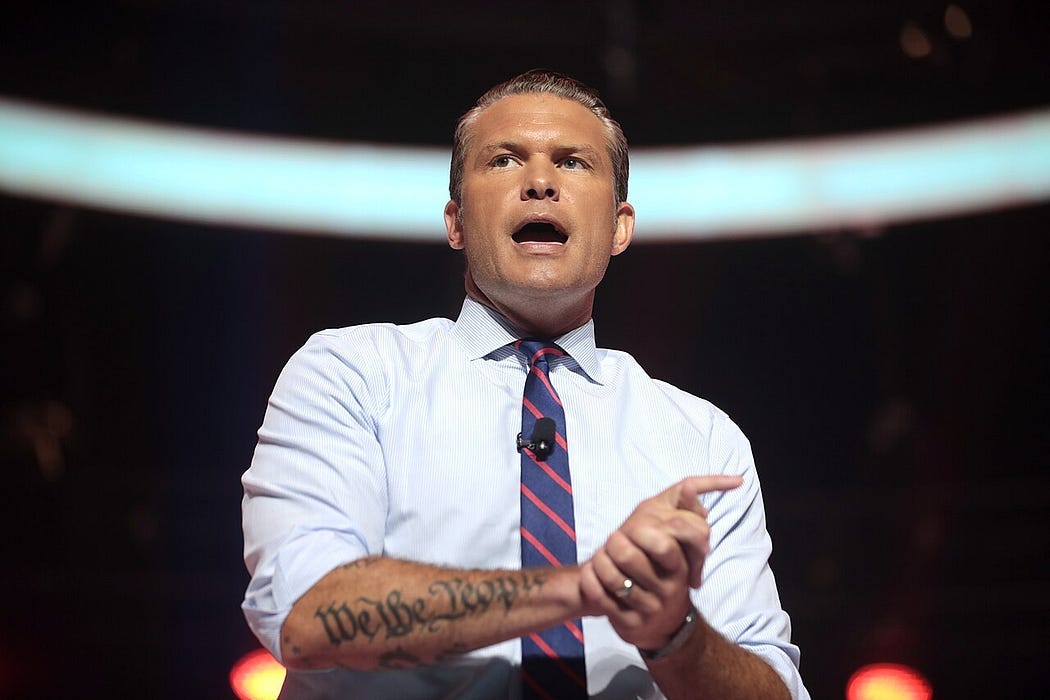Atlantic Editor Accidentally Given Middle Eastern War Plans
But what about her emails? Ah, forget it.

In the latest edition of I Can’t Believe It’s Not Satire, Jeffrey Goldberg, the editor-in-chief of The Atlantic, was accidentally included in a sensitive Defense Department group chat between Secretary of Defense Pete Hegseth, Trump’s national security adviser Mike Waltz, and JD Vance.
In early March, the Atlantic editor was mysteriously added to a private discussion on the encrypted messaging app Signal. The conversation reportedly laid out a war plan for air strikes across the Middle East, several days before the Trump administration bombed Houthi targets in Yemen. In addition to the defense secretary and vice president, Marco Rubio, Tulsi Gabbard, and Scott Bessent were also present.
Goldberg first assumed he was the victim of an elaborate AI-generated prank and was in disbelief once the bombs started falling on cue.
“National security leaders included me in a group chat about upcoming military strikes in Yemen. I didn’t think it could be real,” he wrote. “Then the bombs started falling.”
“The world found out [on March 15] that the United States was bombing Houthi targets across Yemen. I, however, knew two hours before,” he explained. “The plan included precise information about weapons packages, targets, and timing.”
The Houthis are an Iranian-backed militant group occupying the Middle Eastern country of Yemen, which shares borders with Saudi Arabia and Oman. Since war broke out between Israel and the Gaza Strip, they’ve been attacking nearby shipping lanes and engaging in piracy to sanction supporters of Israel.
As such, AIPAC-funded conservatives have been pressuring the Trump administration to launch devastating retaliatory strikes against the paramilitary organization — something Biden had mostly avoided as his administration worked toward a ceasefire.
Not everyone in the president’s cabinet agreed with the war plan, however. Fascinatingly, the conversation featured a tense argument between Pete Hegseth and Vice President Vance — providing a first-hand look into the real-life attitudes and disagreements within the Trump administration.
Namely, the vice president was opposed to striking Yemen, as he believed warmongering would reflect poorly on Trump’s shrinking approval rating. Likewise, liberating the Red Sea would “bail out” Europe, muddying the administration’s calls for the EU to increase its defense expenditures.
“Three percent of US trade runs through the Suez. 40 percent of European trade does. There is a real risk that the public doesn’t understand this or why it’s necessary,” JD Vance warned his peers.
In any case, the fact that the editor-in-chief of a major news publication was accidentally invited to join an otherwise top-secret text conversation containing military battle plans was utterly bizarre. Surprisingly, Goldberg was privy to this information for a full week before he decided to remove himself — in the end, nobody noticed or cared about his presence.
“No one in the chat had seemed to notice that I was there. And I received no subsequent questions about why I left — or, more to the point, who I was.”
As Goldberg mentioned in his analysis, the use of a private messaging server to discuss sensitive national security matters was likely illegal in the first place, regardless of him being invited by accident. For obvious reasons, Trump’s cabinet shouldn’t have been using Signal, a private messaging app, to discuss otherwise top-secret war plans.
If a random newspaper editor was able to get his hands on this conversation, just imagine who else could’ve accessed it. This was an example of national insecurity at its finest.
“Signal is not an authorized venue for sharing information of such a sensitive nature, regardless of whether it has been stamped ‘top secret’ or not,” he pointed out. “Cabinet-level officials were already potentially violating government policy and the law simply by texting one another about the operation.”
But what about her emails?
Once again, I can’t help but revel in Republicans’ brazen hypocrisy. Notoriously, Trump spent the entirety of his 2016 campaign chanting “Lock her up” about Hillary Clinton’s unauthorized use of a private email server during her tenure as Secretary of State. Now, his own cabinet was caught using unsecured private servers to discuss war plans — accessible to random members of the press, no less.
Unfortunately, this whole circus was the predictable result of filling the executive branch with drunkards, idiots, women abusers, and Russian propagandists. Despite waging war on “DEI” and pledging to return a meritocracy to Washington, Trump has only filled his cabinet with the dumbest and most deplorable sycophants he could find.
Pete Hegseth and Mike Waltz are dangerously inept at their jobs, and we should all be very much afraid.

